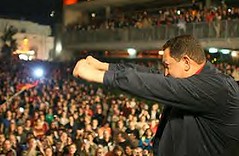
President Hugo Chavez greets supporters in Austria during 2006 visit. A national referendum to accelerate socialist reforms was narrowly defeated on December 2, 2007.
Originally uploaded by Pan-African News Wire File Photos
Colombia says the files show Venezuela supports the leftist rebels, a claim Venezuelan President Hugo Chavez calls 'ridiculous'
By Sibylla Brodzinsky
Correspondent of The Christian Science Monitor
From the May 16, 2008 edition
Bogotá, Colombia - An international forensics team has determined that Colombian officials did not tamper with computer files they say prove Venezuela's close collaboration with leftist rebels.
The computers were purportedly seized by Colombian forces in a March 1 air raid on a guerrilla camp across the border in Ecuador, and have been at the center of a diplomatic crisis between the three South American neighbors.
Interpol Secretary-General Ronald Noble presented the findings of the two-month investigation Thursday, saying that "there was no tampering with or altering of any of the data contained in the user files by any of the Colombian law-enforcement authorities following their seizure on March 1."
The long-awaited report from the international policy agency makes no judgment about the authenticity of the information in the documents, however.
Venezuela's leftist president Hugo Chávez has vehemently denied the claims that his government supported the Revolutionary Armed Forces of Colombia (FARC) rebels, saying the evidence on the laptops is part of a smear campaign by the United States and Colombia.
"The government of Colombia is capable of provoking a war with Venezuela to justify the intervention of the United States," Mr. Chávez said recently. "Whatever they want they will find – it's ridiculous."
The air raid, the laptops, and the crisis
Colombia seized the three laptop computers, three USB memory sticks, and two external hard disks following an air raid March 1 on a rebel camp just across the border in Ecuador. The bombing killed Raúl Reyes, the FARC's No. 2 leader, and 24 others.
The raid sparked a tense diplomatic crisis with Ecuador and Venezuela blasting Colombia for the cross-border attack and Colombia hitting back by announcing that dozens of files found on the computers showed the government of both neighboring countries had close links with the rebels who have been trying to take power for four decades.
Chávez's ideological kinship with the guerrillas is no secret, but evidence that he may have provided logistical support to the FARC would place his government in a difficult position since the rebel group has been labeled a terrorist organization by the United States and the European Union.
Among the more than 37,000 text files extracted from the hard disks and memory sticks, some of which have been leaked to the press, is one e-mail message from the FARC's top military leader, Jorge Briceño, also known as "Mono Jojoy," who proposes to the rebels' governing secretariat that they ask Chávez for a loan of $250 million, "to be repaid when we take power."
Other leaked documents suggest that Venezuelan officials served as middlemen with Australian arms dealers to help the rebels acquire Chinese-made surface-to-air missiles in exchange for training in guerrilla tactics.
No documents released so far indicate that either operation actually took place. José Miguel Insulza, secretary-general of the Organization of American States (OAS), told US lawmakers at a hearing last month that there was "no evidence" that Venezuela supports terrorist groups. "No member country, including this one [the US] has offered the OAS such proof."
John Womack, a professor of Latin American history and economics at Harvard University, warned that the Interpol findings do not necessarily prove any links between Chávez and the FARC. "But the US and Colombia will try to use this as part of an ongoing propaganda war about Chávez," he says.
Colombia had initially threatened to take the case against Chávez before the OAS or the United Nations Security Council to seek sanctions but Mr. Womack says he doesn't think such efforts would get very far. "I don't think most of the other Latin American countries want the confrontation," he says. Womack was one of 21 academics who released an open letter warning that Colombia was misrepresenting the documents on the computers as proof of collaboration between the Venezuelan government and the FARC.
Venezuela a 'state sponsor of terrorism'?
Still, an intense debate is under way in Washington on whether to declare Venezuela a "state sponsor of terrorism," a list that currently includes Iran, Cuba, North Korea, Sudan, and Syria, according to Riordan Roett, director of Western Hemisphere Studies at Johns Hopkins University's School of Advanced International Studies in Washington.
Pragmatists argue that such a move could endanger US oil imports from Venezuela, the fifth-largest foreign source oil to the US, at a time when prices are already sky-high. Hard-liners say they've lost their patience and that Venezuelan action is jeopardizing a close US ally in Colombia, which receives about $500 million a year in mostly military aid from Washington to fight drug trafficking and the leftist insurgency.
"The hard-liners are not going to win this one unless Chávez does something really blatant," predicts Mr. Roett. Washington and Caracas can "yell back and forth to each other, but the oil keeps flowing."
The Colombian government is also debating its reaction. A hard-line stance against Chávez could endanger $6.5 billion in annual trade with Venezuela.
Find this article at:
http://www.csmonitor.com/2008/0516/p25s06-woam.html
No comments:
Post a Comment